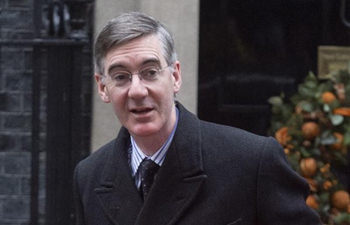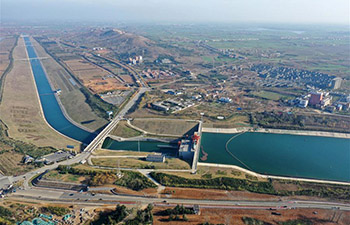
Police officers keep guard during a demonstration in Lille, France, Dec. 17, 2019. France enters the 13th day of anti-pensions reform social movement on Tuesday, with high percentage of transport and education workers going on strike, as well as tens of thousands of protesters hitting streets in main cities across the country. (Photo by Sebastien Courdji/Xinhua)
PARIS, Dec. 17 (Xinhua) -- France enters the 13th day of anti-pensions reform social movement on Tuesday, with high percentage of transport and education workers going on strike, as well as tens of thousands of protesters hitting streets in main cities across the country.
For national railway operator SNCF, 75.8 percent of its drivers, 59.2 percent of controllers and 34 percent of signalmen are on strike, said the company. The mobilization was significant but lower than on Dec. 5, Day 1 of the unions' show of strength against government's plan to overhaul the country's multi-scheme pension system which offers early retirement and other benefits mainly to public sector workers
In the education sector, 25.05 percent of the staff in primary and 23.32 percent in secondary joined the action, according to the Ministry of Education.
Commuters suffer another misery day of transport stoppage. In Paris, eight of the 16 subway lines are closed. Across the country, just one in four high-speed TGV trains are running.
At noon protesters started hitting streets. In Paris, they will march in the afternoon from Place de la Republique to Nation Square, the traditional itinerary of demonstrations.
In Bordeaux, Marseille, Lille, Lyon and Strasbourg, mass demonstrations are also planned.
As usual, police forces stand on high alert as radical and violent protesters, sometimes with faces masked, had vandalised stores and vehicles during previous marches.
Unions wish to repeat their victory of 1995 when a three-week strike, also before Christmas, paralysed the country and forced then Prime Minister Alain Juppe to drop retirement reform plan and resign.
Facing the mounting pressure, the government stood determined to pursue with the reform and promised fresh talks with social partners.
Under the reform plan, a point-based system with same rules applying to all, regardless of profession or sector, will replace the current system of 42 schemes. The legal retirement age remains 62 but people must work till 64, the so-called "pivot age" in the new system, to qualify for a full pension.
The government argues that to guarantee pensions without raising taxes, the only solution is to work longer. Unions believe that by raising retirement age the government made a huge mistake in terms of social justice.
On Monday, Jean-Paul Delevoye, the government's High Commissioner for Pensions, who led negotiations with unions for months, quit his job after media reported that he held several paid jobs in private sector without declaring.
Prime Minister Edouard Philippe invited unions and employers' organisations to joint working meetings on Wednesday and Thursday.











